O P Gauba Summary: Process of Social Change | Sociology Optional for UPSC (Notes) PDF Download
Understanding Social Change
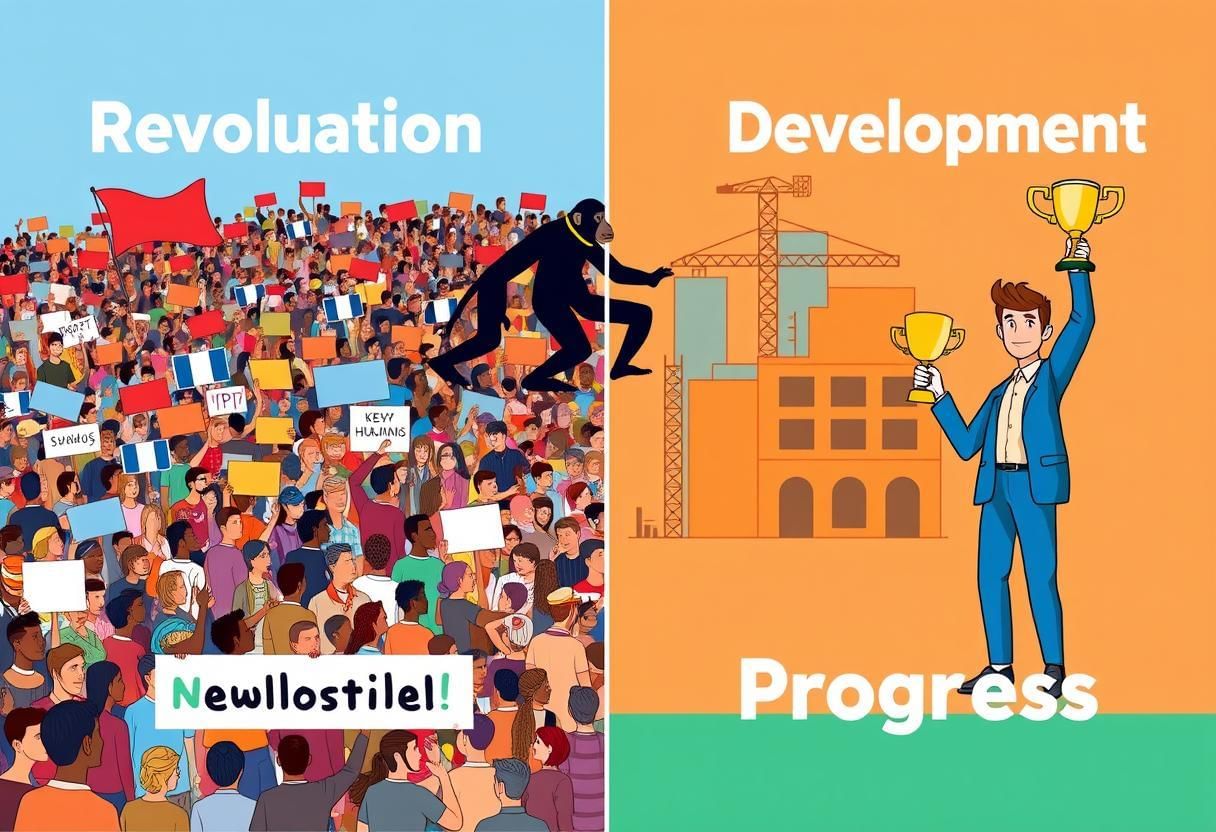 Progressive Revolution
Progressive Revolution
Social change is a natural and constant part of life in a society that is moving forward. It is an ongoing process, as highlighted by Benjamin Disraeli in 1867. The idea is further emphasized by the English poet Lord Alfred Tennyson, who said, "Old order changeth yielding place to new," suggesting that change is an essential aspect of society.
A student studying social science might wonder about various aspects of social change, such as whether it follows a specific pattern or is unpredictable, whether it is controllable or happens on its own, and whether the future is predetermined or uncertain. These questions are related to important concepts like revolution, evolution, development, and progress.
1. Revolution
A revolution involves a rapid and profound transformation in a social system, affecting all aspects of social life, including:
- Power structure: Changes in who holds power and authority within society.
- Economy: Alterations in economic systems, including how resources are produced, distributed, and consumed.
- Ways of living: Shifts in daily lifestyles, habits, and practices of individuals and communities.
- Norms and beliefs: Transformations in the accepted standards and fundamental beliefs of society.
Revolutions can be sparked by mass uprisings, mobilizations, significant discoveries, or groundbreaking inventions. While the underlying factors that lead to a revolution may develop gradually over time, their impact is felt suddenly and intensely at a specific moment.
2. Evolution
Evolution views social change as a gradual process involving numerous small changes that, over time, lead to significant and complex transformations in society. This concept, borrowed from biology, likens social change to the evolution of plants and animals, emphasizing the transition from simpler forms of social organization to more complex ones.
3. Development
Development refers to the process of strengthening and enhancing a system or institution, making it more organized and effective in meeting human needs and aspirations. It involves improvements that increase the capacity and efficiency of social structures.
4. Progress
- Progress signifies the transformation of a system or institution into a new form that is perceived as better and morally superior to its predecessor. Unlike other forms of social change, progress involves a moral evaluation of the change, assessing its value for humanity based on normative criteria.
- For instance, Auguste Comte proposed that as society advances scientifically, it evolves from a military society, characterized by strict regulation of thought and action, to an industrial society, which allows greater freedom of thought. Similarly, Herbert Spencer described this shift in political evolution, highlighting the move from integration in military society to differentiation in industrial society.
- Henry Sumner Maine argued that progressive societies evolve from a state of 'status', where individuals have fixed roles, to 'contract', where they have the freedom to enter into new relationships voluntarily. This concept aligns with Spencer's views on military versus industrial societies.
- Ferdinand Tonnies introduced the idea of transitioning from gemeinschaft (community) to gesellschaft (association), where communities are based on natural connections and associations are formed through rational agreements. Emile Durkheim distinguished between less advanced societies with 'mechanical solidarity' based on individual similarities and modern societies with 'organic solidarity' reliant on interdependence and division of labor. Max Weber differentiated traditional societies governed by established customs from modern societies operating under legal-rational authority based on rational rules.
Marxist Theory of Revolutionary Change
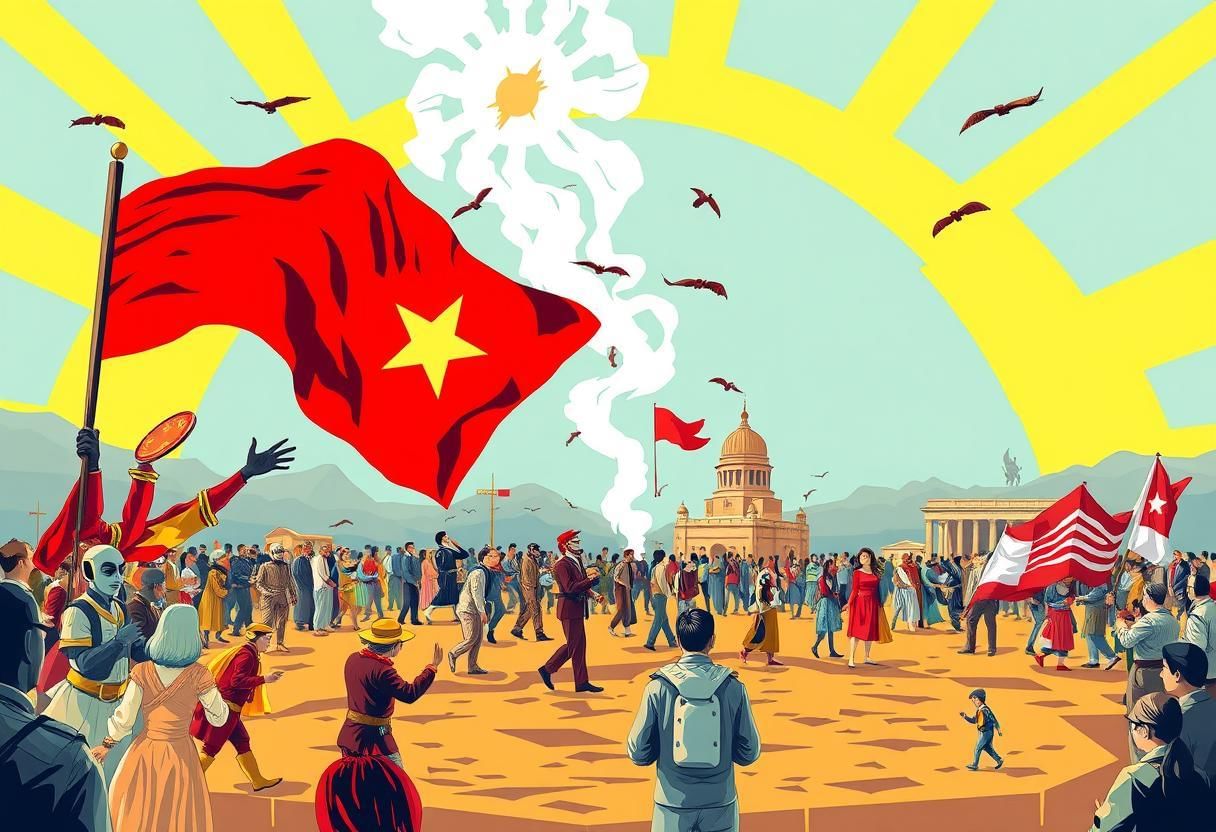 Social Revolution
Social Revolution
The Marxist theory of revolutionary change is rooted in the ideas of Karl Marx and Friedrich Engels. Central to Marxist thought is the concept of social change. Marx emphasized this in his work Theses on Feuerbach , where he argued that philosophers have merely interpreted the world; the real task is to change it. This change involves altering society, as the physical world is governed by unchangeable laws. These laws, such as the law of gravity, operate independently of human actions and are bound by necessity. The idea of freedom can only be realized within social contexts.
Necessity and Freedom
In Anti-Dühring , Engels explains that necessity refers to the conditions governing human life according to unchanging natural laws. While humans can understand these laws and use them to their advantage, they cannot alter them at will. Historically, human existence has been governed by necessity, but with the emergence of a classless and stateless society, humanity will enter a phase of freedom. In this phase, individuals will have the ability to shape their social lives according to their desires. Marx and Engels describe this transition as a shift from necessity to freedom.
The mechanism of social change, according to Marx and Engels, is explained through their principles of dialectical materialism and historical materialism.
Dialectical Materialism
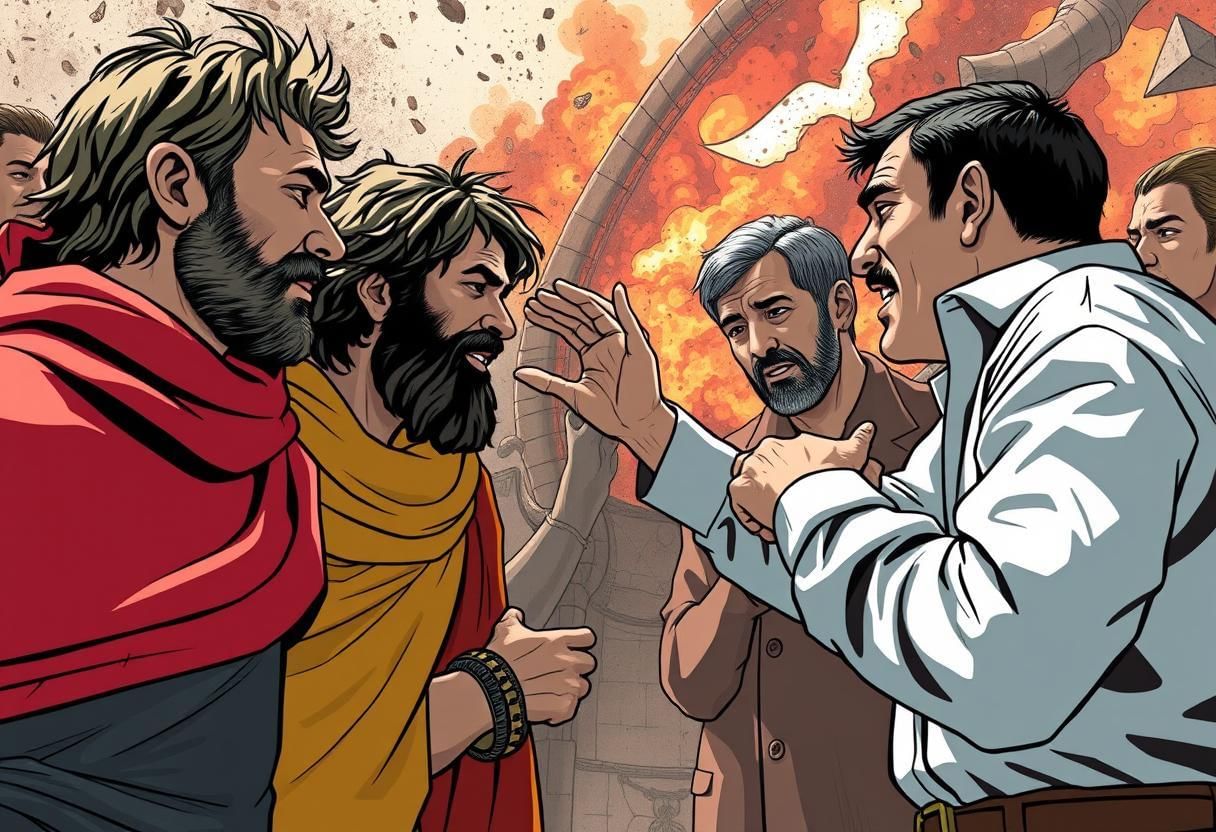 Social Transformation
Social Transformation
Dialectical materialism is the philosophical basis for understanding and driving social change. It was developed as a response to the ideas of G.W.F. Hegel, a German philosopher who believed that 'idea' or 'consciousness' was the core of the universe and the engine of historical progress. However, Karl Marx challenged this view, arguing that 'matter' is the fundamental reality, and it is the driving force behind all social change. For Marx, each stage of social life is a reflection of its material conditions, which is the basis of his theory of 'materialism' in opposition to Hegel's 'idealism'.
Hegel used the dialectical method to explain social change, focusing on how ideas evolve through debate. Marx combined this method with his materialist perspective, leading to the concept of dialectical materialism. The dialectical process involves the interaction of a thesis (an initial idea) and an antithesis (its opposing idea), resulting in a synthesis that incorporates elements of both. This process continues, with each synthesis becoming a new thesis, moving closer to the truth.
While Hegel saw social institutions as reflections of ideas and believed that the evolution of ideas drives social development, he viewed the state as the pinnacle of ethical life and truth. Marx, on the other hand, maintained that social institutions are shaped by material conditions, particularly the means of economic production. This shift led Marx to replace Hegel's 'dialectical idealism' with his own 'dialectical materialism'.
George H. Sabine, in his work "A History of Political Theory," highlights the continuity between Marx and Hegel in significant ways:
- Dialectic as a Method: Both philosophers viewed the dialectic as a powerful method for understanding social development. For Marx, the dialectic supported a theory of social progress aligned with the realization of higher moral values, even though he framed his philosophy as materialism.
- Struggle as a Driver of Change: Both Marx and Hegel saw struggle, particularly between social classes, as the engine of social change. They emphasized that economic power, rather than political power, is the primary driver, with political power being a byproduct of economic status.
Friedrich Engels, in his work "Anti-Duhring," defined dialectics as the study of the general laws governing the motion and development of nature, human society, and thought. He identified three fundamental laws of dialectics, illustrated with examples from the material world:
Three Laws of Dialectics
- Transformation of Quantity into Quality: This law states that changes in quantity can lead to changes in quality and vice versa. For instance, at specific temperatures, water can transform into ice or steam, demonstrating a change in quality while remaining the same substance.
- Interpenetration of Opposites: Opposites can coexist and interpenetrate in various forms. For example, iron is considered hard, but its ability to be shaped indicates a degree of softness. Similarly, a flower is soft yet maintains its shape, implying it has a degree of hardness.
- Negation of Negation: This principle signifies progress through stages of development, where each stage contains the seeds of its own decline, followed by a higher stage of development. In nature, when a seed is planted, it sprouts, negating the seed in the process. As the seedling grows into a plant, it is also negated, leading to the development of an ear of corn, which represents progress and the production of better-quality seeds.
Historical Materialism
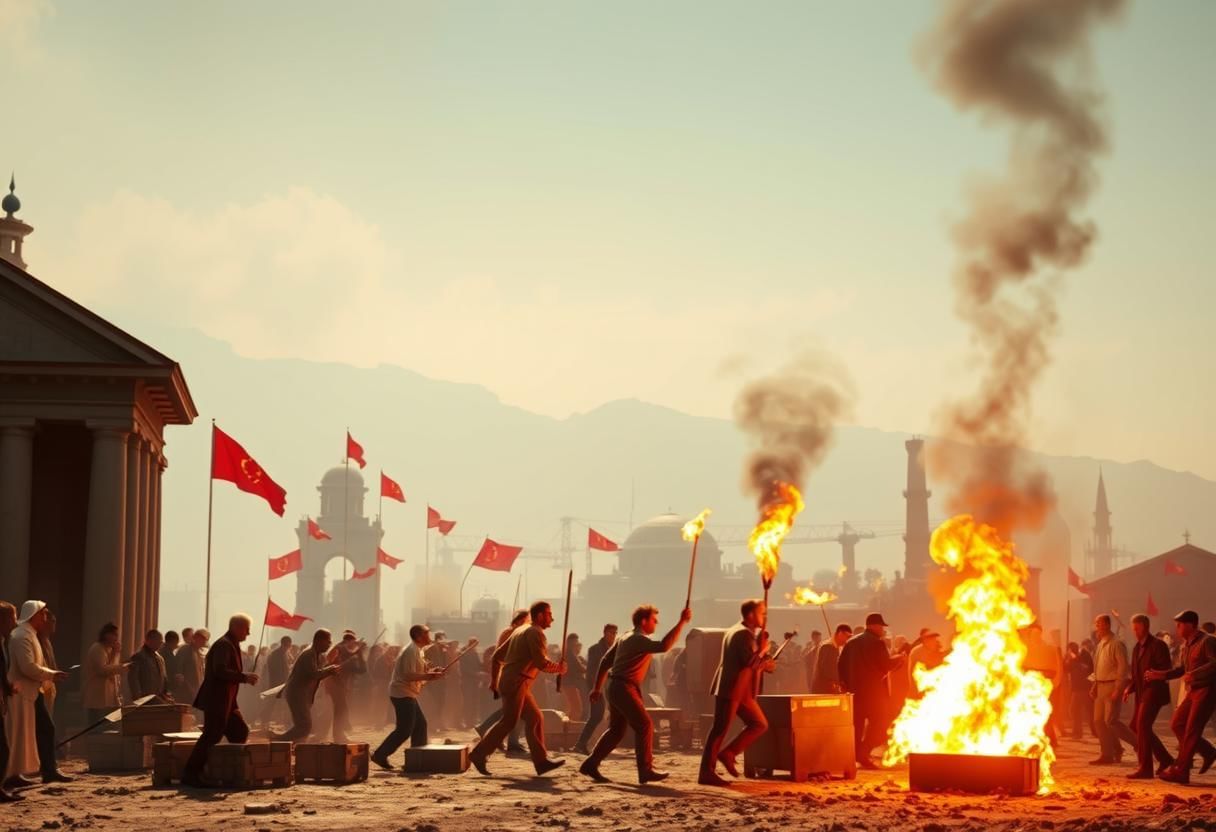 Economic Transformation
Economic Transformation
Historical materialism is a concept that illustrates how the laws of dialectics apply to social life. It emphasizes the importance of economic relations in shaping society and social progress.
Dialectical Materialism vs. Historical Materialism
- Dialectical materialism is the philosophical basis of Marxism, focusing on ideas and concepts.
- Historical materialism is the empirical foundation, dealing with social and historical studies, similar to a scientific approach.
Economic Relations in Society
- Historical materialism posits that the economic relations of society in any given era—how people produce, trade, and distribute goods—are fundamental to social progress.
- All social relationships at any historical point are influenced by the prevailing economic conditions.
Production as the Vital Human Activity
- Marx argues that humanity's survival hinges on our ability to produce material goods, making production the most crucial human activity.
- Society exists primarily for economic production because collective efforts yield more than individual ones.
- An ideal society would fulfill all its members' essential needs, but achieving this perfection is a gradual process.
Internal Challenges and the Role of Religion
- Throughout history, society has faced internal challenges, such as
- 1. Unmet needs due to inadequate production methods
- 2. Flawed understanding of truth, leading to unrealistic visions of a better world
- 3. These challenges have contributed to the rise of religion as a response to human suffering in an economically constrained world.
- Marx's Perspective on Religion
- Marx referred to religion as "the opium of the people," implying that when societal needs are unmet, religion becomes a source of comfort and refuge.
Material Production and Social Life
Material production is at the heart of human social life, and changes in this process drive historical progress. Marx's perspective on historical change is rooted in historical materialism, where the mode of production forms the base of society.
Production and Society
- In the social production of their lives, people enter into relationships that are essential and independent of their will—relations of production that correspond to a specific stage of development of their material productive forces.
- The totality of these production relations constitutes the economic structure, which forms the real basis for the legal and political superstructure.
Base and Superstructure
- The mode of production constitutes the base of society.
- Legal and political institutions, along with religion and morals, make up the superstructure, which adapts to changes in the base.
Forces and Relations of Production
Forces of Production
- Means of production: tools, machines, and factories.
- Labour power: skills, knowledge, and experience of workers.
Relations of Production
- Structure of economic ownership.
- Dominant class: those who own the means of production.
- Dependent class: those who only have labour power.
Conflict and Change
- The drive for better production methods to address scarcity leads to advancements in the forces of production.
- Means of production improve through scientific discoveries and new techniques.
- Labour power enhances through education and training.
- As the forces of production advance, they create a conflict with the existing relations of production.
- This conflict escalates until the current relations of production can no longer accommodate the development level of the forces of production.
- Historical Example: Industrialization
- The rise of industrialization in the forces of production eventually leads to the decline of the feudal system in the relations of production, which divides society into lords and serfs.
- This transition marks the establishment of a new capitalist mode of production.
Understanding Historical Development
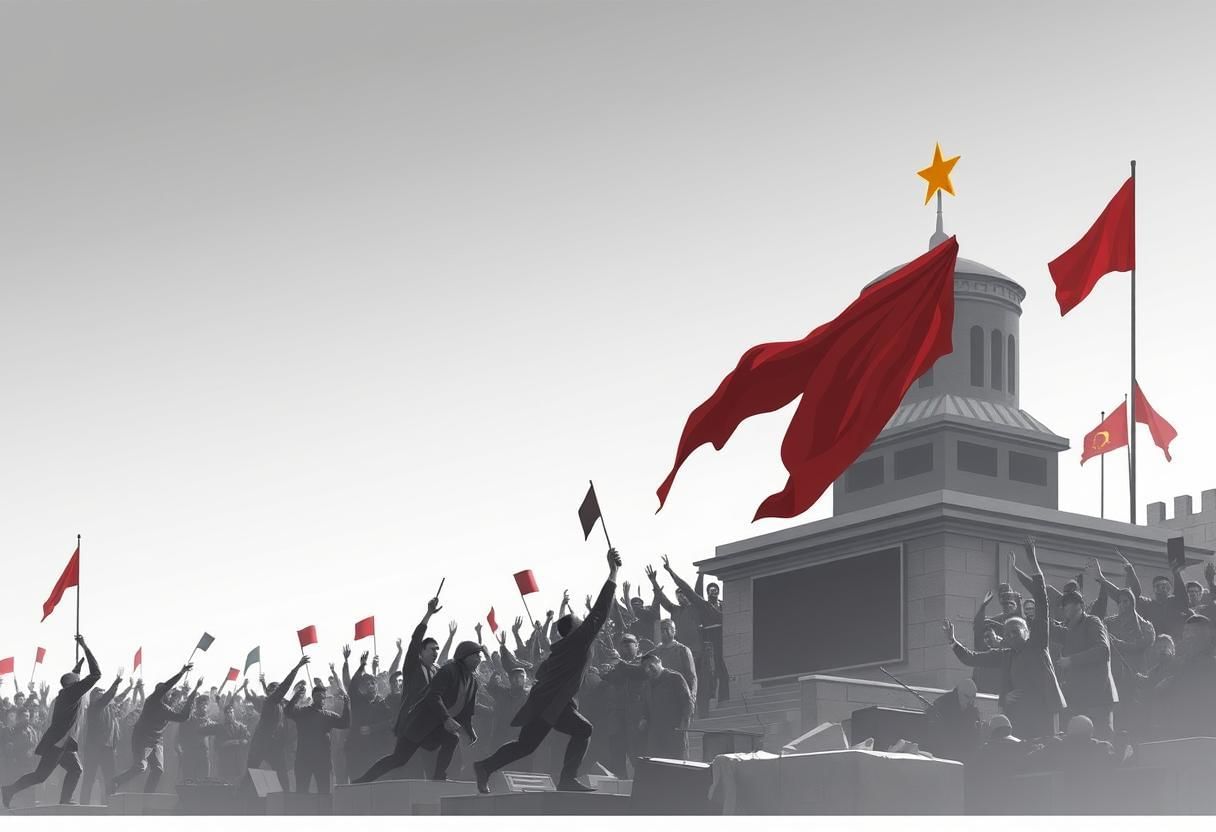 Class Struggle Revolution
Class Struggle Revolution
The historical development of society can be explained through the dialectical method. This method involves the idea that the current social order, known as the thesis, eventually leads to a conflicting force called the antithesis, which represents a new mode of production. When new inventions or discoveries emerge, they create a conflict between the productive forces and the existing production relations, particularly the property system, which becomes a hindrance to progress.
As a result of this conflict, a revolutionary class arises, challenging and overthrowing the existing order through violent means. The old order is then replaced by the new one. For instance, slave society is followed by feudal society, which is later replaced by capitalist society. Ultimately, capitalist society is expected to transition into socialist society. According to dialectical logic, each societal stage, while not perfect, contains the seeds of its own downfall. Karl Marx viewed the capitalist society of his time as flawed due to the division into opposing classes—the bourgeoisie (owners of capital) and the proletariat (working class) —and the exploitation of the dependent class. This inherent contradiction doomed capitalist society, as it was marked by the exploitation of one class by another.
Main Stages of Historical Development
- Primitive Communism. Production forms are minimal and owned communally.
- Ancient Slave-Owning Society. Masters own the means of production, and slaves perform the labor.
- Medieval Feudal Society. Feudal lords own the means of production, and serfs do the work.
- Modern Capitalist Society. Capitalists own the means of production, and the proletariat, or propertyless workers, provide the labor.
At each stage, society is divided into conflicting classes, with the class that owns the means of production dominating others, leading to ongoing tension and conflict. The conditions of production at each stage shape the societal structure. For example, the hand-mill technology leads to feudal society, while the steam-mill technology gives rise to industrial capitalism. The societal structure, in turn, influences attitudes, actions, and civilizations. All social, political, and intellectual relations, including religious and legal systems, emerge from the material conditions of life.
Transition from Feudalism to Capitalism
The forces of capitalism brought about significant progress by dismantling the feudal system. However, Marx viewed capitalism as a temporary phase. According to George H. Sabine, the end of feudalism marked the rise of the middle class and the establishment of a political system that empowered it, ultimately leading to a democratic republic. The French Revolution played a crucial role in this transformation, shifting social dominance from nobility and clergy to the industrial and commercial middle class. The revolution created a state mechanism for middle-class repression and exploitation, justified by the philosophy of natural rights in politics and economics.
Inevitability of Class Conflict
Class conflict became inevitable during the capitalist stage of historical development, indicating the need for another revolution. Marx anticipated a significant social revolution where the rising proletariat would replace the middle class, just as the middle class had replaced the feudal class. This revolution would lead to the end of exploitation and the establishment of a society without social class distinctions, marking the true beginning of history as a record of full human self-realization.
Outline of Historical Materialism
- Society Base
- Superstructure. Legal and Political Structure, Religion, Morals, Social Practices, Literature, Art, Culture, etc.
- Mode of Production
- Forces of Production. Tools and Equipment, Labour Power, Human Knowledge and Skills
- Relations of Production
- Contending Classes
- Slave-Owning Society. Master and Slave
- Feudal Society. Lord and Serf
- Capitalist Society. Capitalist and Worker
Theory of Revolution
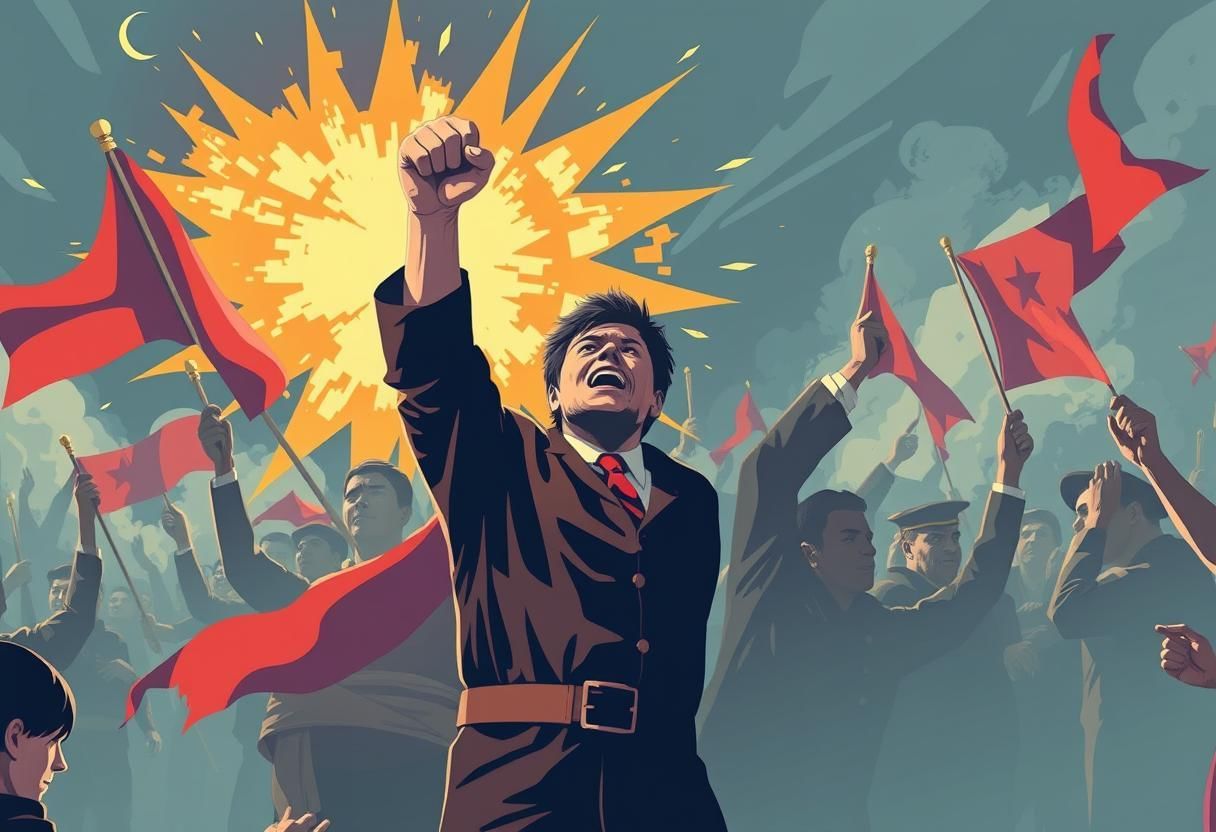 Social Revolution
Social Revolution
The Marxist theory of revolution is an essential aspect of dialectical materialism. According to this theory, the development of ideas (thesis) and their opposites (antithesis) occurs gradually over time. However, when these opposing forces come into conflict, a sudden change (synthesis) takes place. A historical period does not conclude until it hinders the growth of productive forces, which must be fully developed before any significant transformation occurs. This transformation is as sudden as ice melting into water or water turning into steam. During such a revolutionary shift, the entire structure of society undergoes a transformation, leading to the establishment of a new society until it, too, is eventually overthrown. Therefore, any major social change is inherently the result of a revolution, which is pivotal for social progress.
Each stage of social development introduces new ideas, attitudes, and values that reinforce the existing social order. These ideas help justify the system and constitute the dominant ideology. The dominant class, which benefits from the current system, will resist change to safeguard its interests. Even when the existing system can no longer accommodate new productive forces, it will continue to oppose change. However, these new productive forces must prevail over this resistance and dismantle the old economic structure along with its supporting systems to establish a new socio-economic and political order. The dominant class will only relinquish its power when compelled to do so by a revolutionary class. Thus, revolution is a crucial component of the class struggle and a necessary condition for transferring power and initiating a new era. In essence, social revolution is the primary catalyst for social change.
Class Struggle
According to Marxist theory, the persistent conflict between the dominant class and the dependent class originated with the advent of private property. The dominant class comprises those who own the means of production, while the dependent class survives through labor and is exploited by the dominant class. Their interests are inherently antagonistic. This struggle has escalated under capitalism. Following a socialist revolution, this conflict will continue until a classless society is realised. During this transitional period, the working class will exert its influence to eradicate the remnants of capitalism.
Ideology
In Marxist theory, ideology encompasses the set of ideas, beliefs, and arguments that justify the rule of the dominant class. It promotes a value system that renders the exploitation of the dependent class acceptable.
Each new phase in social history emerges from revolution. The capitalist system evolved gradually through various historical events, including significant revolutions like the French Revolution (1789). However, as capitalism has become an obstacle to new productive forces, it must be overthrown by the new revolutionary class—the proletariat. In the conclusion of The Communist Manifesto (1848), Marx and Engels asserted that the goals of the Communists could only be achieved through the forcible overthrow of existing social conditions. They called for an increase in revolutionary class consciousness and a strong organisation of the proletariat to realise their historical objective. While revolution is inevitable, a conscious effort by the proletariat will accelerate the path towards revolution.
The proletarian revolution will differ fundamentally from previous revolutions in history. Past revolutions were led by a small class aiming to establish its own dominance, often at the expense of another vulnerable class created by new production methods. For instance, the bourgeois revolution was carried out by a small bourgeois class seeking to implement capitalism to exploit the proletariat. In contrast, the proletarian revolution will be a movement of the majority against the minority, a revolt of the masses against their exploiters. Its goal is not to transfer power from one class to another but to eliminate the system of exploitation altogether. This will be the final revolution in history, replacing capitalism with socialism. It will abolish private property through the socialisation of the means of production and establish a temporary dictatorship of the proletariat to prevent counter-revolutions and eliminate the last remnants of capitalism. This will pave the way for the emergence of communism, with socialism expected to thrive under the guidance of the dictatorship of the proletariat.
Under the Dictatorship of the Proletariat
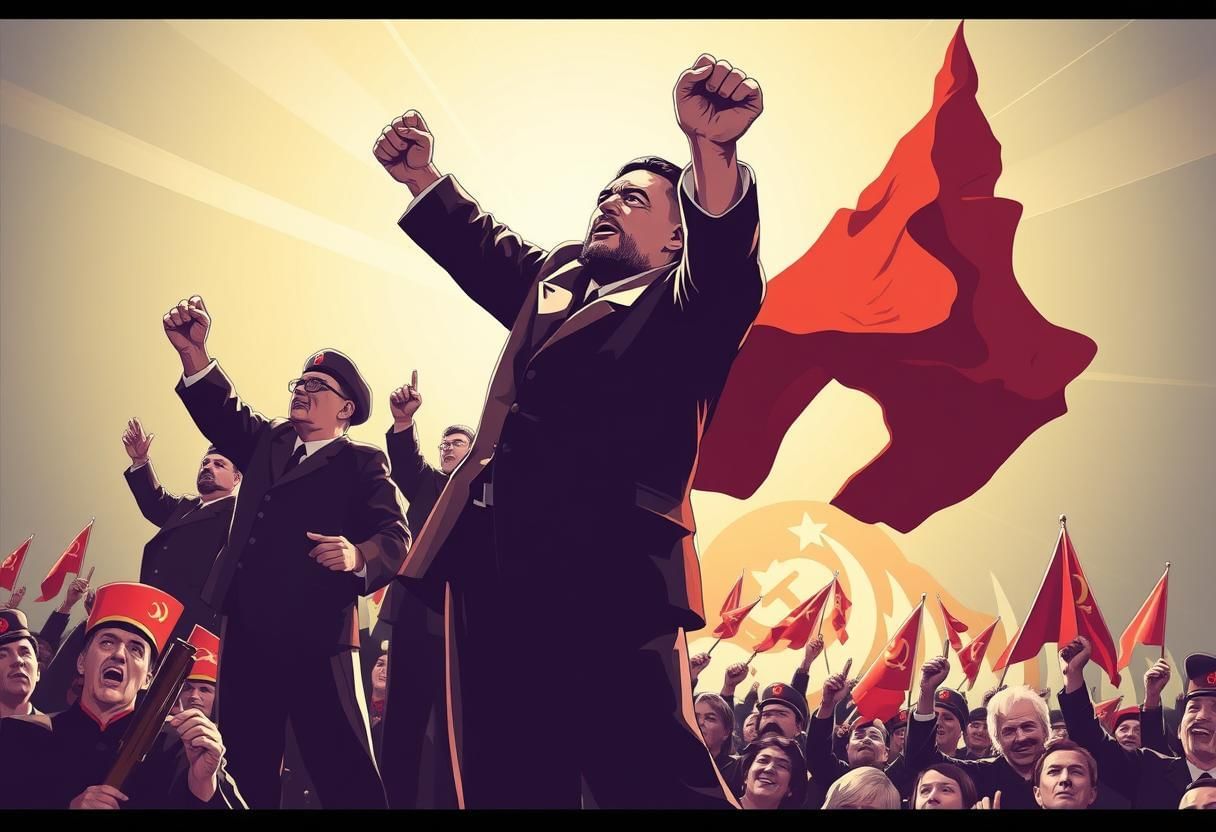 Revolutionary Struggle
Revolutionary Struggle
Under the dictatorship of the proletariat, classes and the oppressive mechanism of the state still exist. However, this state is fundamentally different from previous ones. It is not a state of property-holders oppressing the propertyless. Instead, it is a state of the propertyless aimed at abolishing private property, along with its accompanying ideology and culture. The socialist state will:
- Fully develop new productive forces.
- Maximise technological advancement.
- Prioritise social needs over private profit.
- Prepare for a classless society and the eventual "withering away" of the state.
Therefore, communism will naturally arise from socialism without the need for a new revolution. As Lenin noted in his State and Revolution (1917), socialist society is still flawed and retains elements of the bourgeois rights system, such as "from each according to his ability, to each according to his work." In contrast, communism represents the pinnacle of production systems with the highest development of productive forces, governed by the principle of "from each according to his ability, to each according to his need."
Freedom and the State
While the state exists, there can be no freedom. When there is freedom, there will be no state.
The Class Struggle
Some later Marxist thinkers, particularly Mao Zedong (1893-1976), contended that the class struggle continues even after the establishment of a communist state, albeit in new forms. The ongoing contradictions within a communist state—between:
- Progress and conservatism,
- The advanced and the backward,
- The positive and the negative,
- Productive forces and production conditions—
These contradictions must be continually addressed to realise the objectives of communism. Hence, revolution is seen as a continuous process, often referred to as the doctrine of permanent revolution.
Liberal Theory of Change
The liberal theory of incremental change, advocated by philosopher Karl Popper (1902-94), posits that human history is not predetermined and can be shaped by rational individuals. Liberal thinkers emphasise the capacity of humans to utilise their intellect and willpower to mould social institutions according to their preferences. They favour reform over revolution as a means of social reconstruction, and Popper offers robust arguments in favour of this approach.
Critique of Historicism by Karl Popper
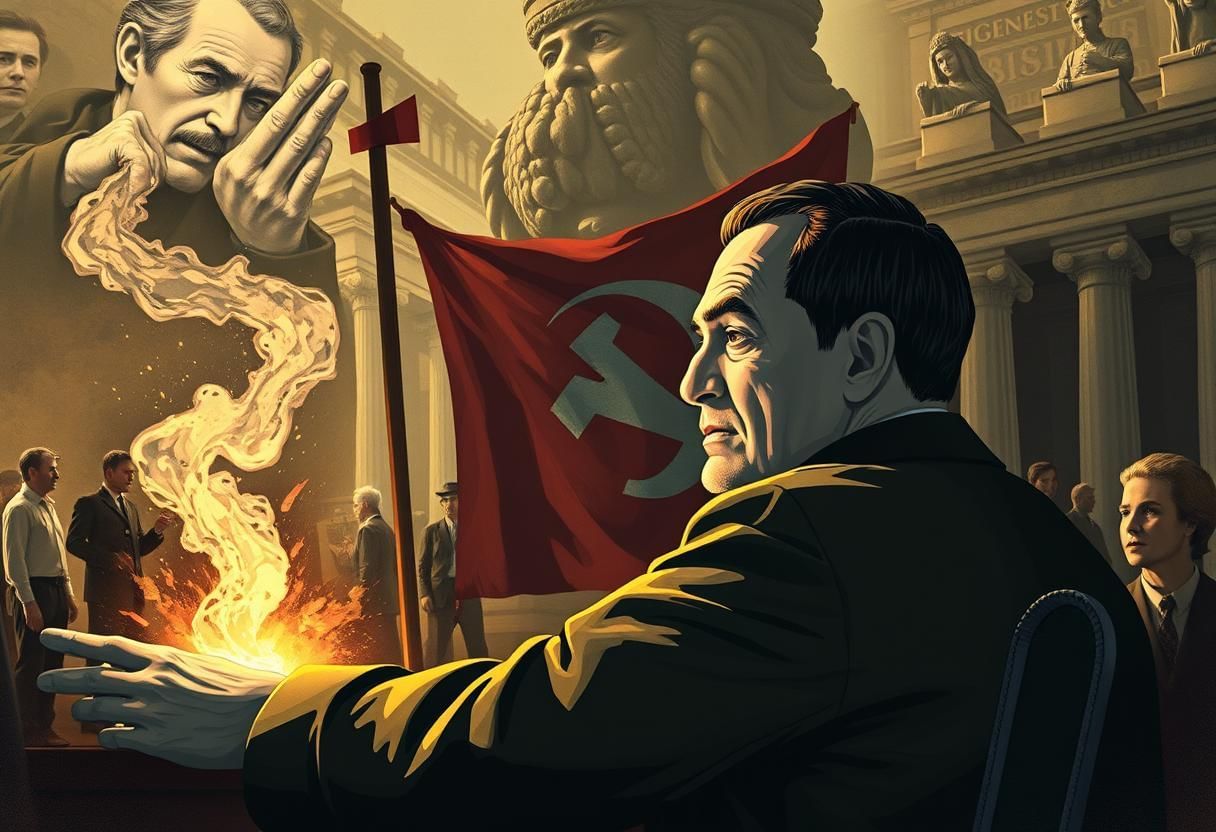 Philosophical Reflections
Philosophical Reflections
In his influential book, The Open Society and Its Enemies (1945), Karl Popper criticizes historicism, which is the idea that history follows certain inevitable laws of development, as suggested by thinkers like G.W.F. Hegel, Karl Marx, and Oswald Spengler. He argues that this belief undermines human creativity and suggests that history is beyond our control. Popper sees historicism as a cover for totalitarian ideologies, using the notion of inevitable historical progress to justify oppressive regimes.
Popper labels historicism a "pseudo-science " because it tries to explain all of history with a single principle, leaving no room for exceptions. Real science, according to Popper, begins with a testable hypothesis that can be proven wrong through observation. In contrast, pseudo-sciences avoid falsification by constantly adjusting their claims to fit any possible evidence. Historicism, by claiming unchangeable laws of history, fits this pseudo-scientific approach.
Critique of Historicism in "The Open Society and Its Enemies"
In The Open Society and Its Enemies, Popper critiques historicism, focusing on figures like Plato, Hegel, and Marx. He argues that these thinkers promote a closed society that stifles free speech and critical thinking. Plato, in particular, is seen as laying the groundwork for totalitarianism by proposing a "noble lie" to justify a hierarchical society. Hegel and Marx are critiqued for their views on the state's role in freedom and the idea of class struggle, respectively. Popper believes that science and freedom can only flourish in an open society that welcomes new ideas.
In "The Poverty of Historicism" (1957), Popper challenges all forms of historicism for two main reasons:
- (a) He argues that the growth of knowledge itself influences the course of history, making it impossible to predict the effects of knowledge in advance.
- (b) He contends that social science can only produce laws for specific, isolated social units, not for total social development.
Popper believes that historical laws are merely indications of historical tendencies. For example, Marx's law about the concentration of capital reflects a tendency rather than a strict law. Making predictions based on such tendencies can be misleading and unlikely to yield accurate results.
Focus on Methodological Individualism
 Cultural Evolution
Cultural Evolution
Popper's view on social science offers a way to tackle social reconstruction. He criticized the methodological holism of Hegel and Marx, who sought to create universal laws for historical development.
Methodological holism perceives social life as an interconnected whole. According to this perspective, social behavior cannot be understood merely by examining individual actions; instead, society should be regarded as a single unit.
Historicism aims to establish laws about society in its entirety, closely aligning with methodological holism.
Methodological Individualism
In contrast, methodological individualism asserts that no social science or historical explanation is valid unless it centers on individuals— their characteristics, goals, beliefs, and actions.
Popper, an advocate of this approach, contended that historicism lacks rational justification because history is singular and influenced by the unpredictable advancement of knowledge. Consequently, the future cannot be anticipated using conventional scientific methods.
He vehemently opposed central planning and holistic social engineering, as these attempts to dictate society's future based on fixed notions.
Concept of Incremental Change
 Gradual Progress
Gradual Progress
Piecemeal social engineering or incremental change is a gradual approach to social change that focuses on making small, manageable adjustments rather than attempting complete and immediate transformation. This method aims to minimize the risk of negative consequences by allowing for quick corrections when unforeseen issues arise.
Utopian social engineering involves ambitious and often impractical visions of societal change, such as creating a classless society. These ideas can lead to authoritarian measures and violence due to the lack of consensus on their desirability and the methods to achieve them. In contrast, piecemeal reform targets specific issues that are widely agreed upon, facilitating smoother and more peaceful implementation.
Utopian plans may take a long time to realize, with the sacrifices of one generation not benefiting until a later time. This can create injustices where those who endure hardships for radical reform do not see the rewards, while those who enjoy the benefits do not understand the struggles involved. Piecemeal social engineering avoids such scenarios by ensuring that benefits and sacrifices are more closely aligned.
Popper argues that scientific knowledge evolves through gradual approximation to the truth, with continuous modifications in beliefs and methods. Similarly, social reform is most effective when it occurs step by step, mirroring the process of scientific progress. While Popper does not advocate for revolutionary change in society, he is more open to revolutions in thought, as they do not involve violence.
A Critical Appraisal
Popper's concept of incremental change provides a fresh rationale for liberal theory and emphasizes the preference for reform over revolution. He derives moral implications from his discussions on scientific methodologies.
However, the endorsement of gradual reforms by Popper remains contentious among scholars. Georges Sorel, a French socialist, contended that gradual reform fails to produce enduring outcomes. He argued that minor concessions offered by the privileged to the oppressed merely provide temporary relief and do not address the root causes of inequality.
Supporters of reform criticize the violence and bloodshed often associated with revolutions. They argue that there is no foolproof method for social reconstruction and caution that replacing one form of privilege with another is a real risk if not managed carefully. On the other hand, reformists must ensure that their initiatives do not result in quick reversals but instead foster equality of opportunity and reduce significant disparities in power, prestige, and wealth.
|
112 videos|389 docs
|
FAQs on O P Gauba Summary: Process of Social Change - Sociology Optional for UPSC (Notes)
| 1. What is the significance of dialectical materialism in understanding social change? |  |
| 2. How does historical materialism differ from dialectical materialism? |  |
| 3. What role does the theory of revolution play in the context of social change? |  |
| 4. What does the rejection of historicism entail in social change analysis? |  |
| 5. How does the concept of incremental change contribute to our understanding of social dynamics? |  |
















